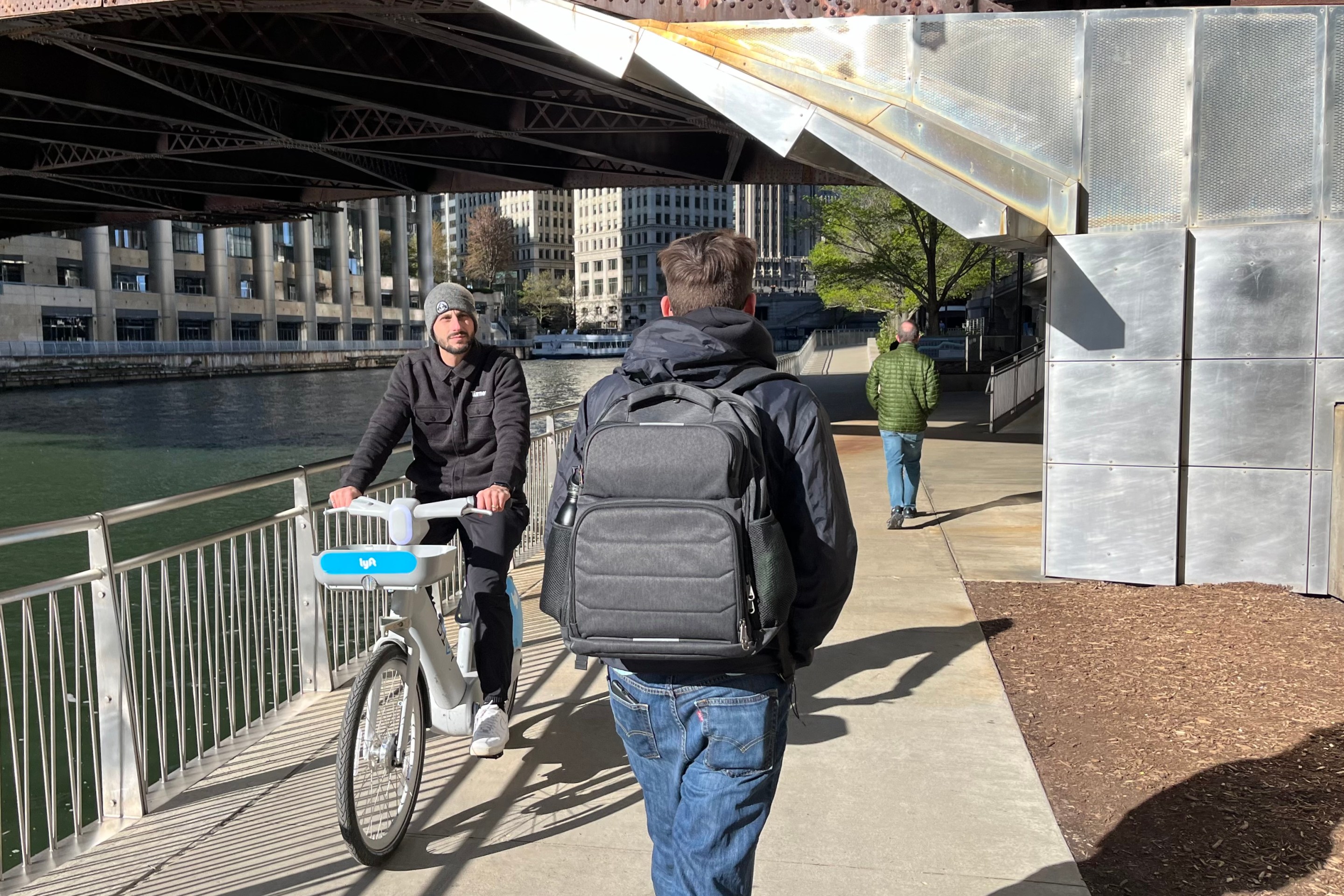Instead of spending millions on parking for a new clinic, why not subsidize transit use?
3:07 PM CST on February 11, 2021
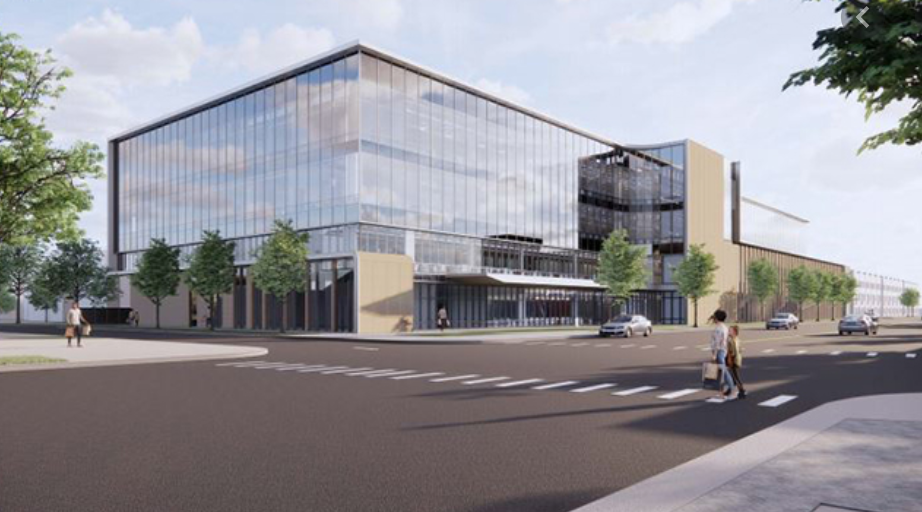
Rendering of the new Northwestern clinic.
In a car-dominated city, many motorists fail to question the need to drive or realize the impact they have on congestion, air quality, noise pollution, and other human beings who get around by active means.
Proposals that would require drivers to adjust their routes a bit are often met with fierce opposition, like the angry response to traffic diverters that were piloted on Manor Avenue in Ravenswood Manor as part of a neighborhood greenway project in 2016. Plans for protected bike lanes often face a backlash from motorists obsessed with maintaining easy car parking, as we saw recently with the city's proposal for a new bikeway on Hubbard Street in the West Loop.
Meanwhile, when people who bike bring up real concerns about aggressive driving or near misses on key biking streets, they're often told that they should change their route. For example, when I floated the idea of making the Glenwood Greenway a car-free street after having some run-ins with drivers on that important cycling corridor, one commenter said, "There are plenty of other side streets besides Glenwood to ride up and down." Somehow those who are using their own energy to get around are supposed to go out of their way to accommodate others who simply have to press a pedal in order to accelerate from 0-40 mph.
Currently there's neighborhood opposition to plans for a new $150 million Northwestern Medicine clinic on Irving Park Road between Kilbourn and Kenneth Avenues in the Old Irving Park neighborhood, and while cycling isn't part of that conversation, the backlash involves elements of car culture. According to a Block Club Chicago article by Alex V. Hernandez, at a community meeting last week, nearby neighbors expressed concerns about traffic congestion and speeding from the roughly 2,600 new car trips a day the new clinic is projected to generate. They also voiced concerns about added car traffic from other new developments coming to the Six Corners area near Irving Park and Cicero and Milwaukee avenues.
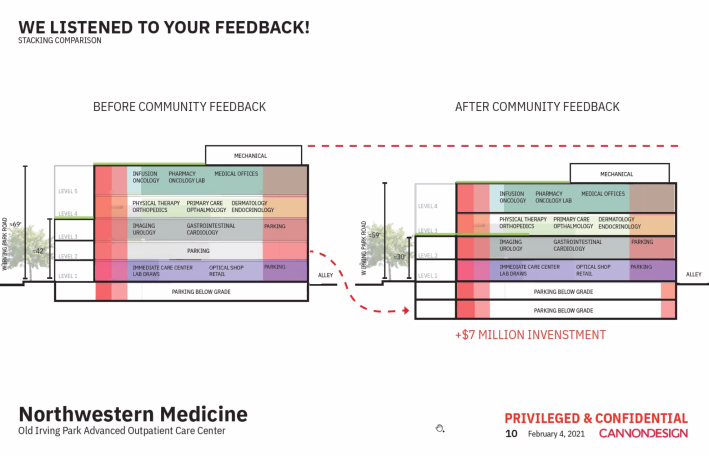
The original plan for the new clinic called for a five-story building with retail space and a 350 parking spots, with one level of parking on the second floor and another below ground, according to Block Club. But after getting feedback residents opposed to the height via 45th Ward alderman Jim Gardiner, Northwestern is planning a four-story structure and moving all the parking underground, which is adding a whopping $7 million to the plan.
But some neighbors still aren't happy with the current plan, which calls for putting the garage entrance on Kilbourn Avenue, a side street Block Club reported. A stoplight would be installed at Irving Park and Kilbourn, the side street would be widened by four feet to accommodate the extra traffic, speed humps are proposed for streets around the new building, and signs would direct visitors not to use residential roadways as cut-through routes. The residents asked why the entrance to the new clinic's parking lot couldn’t be placed on Irving Park. Peter Lemmon, a transportation engineer with Kimley-Horn and Associates, which is consulting on the project, said the Chicago Department of Transportation would not allow the entrance to be placed on Irving Park.
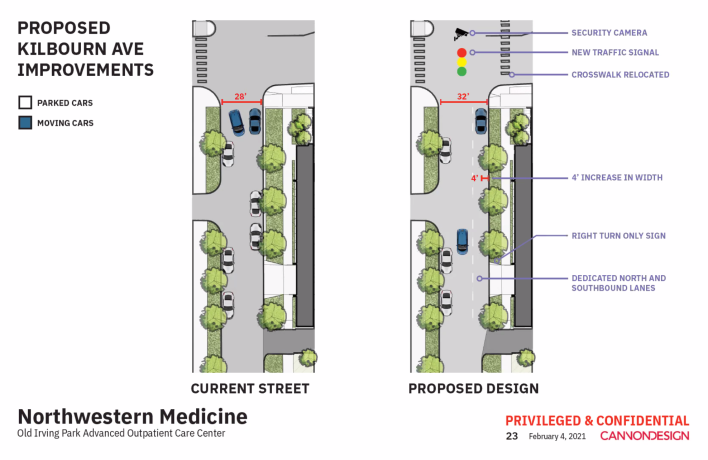
It's unfortunate that, rather than spending many millions of dollars on expensive underground parking, Northwestern isn't using that money to help reduce the number of car trips the clinic will generate and lower the need for parking. Could some of that money have instead been used to offer free or reduced-fare transit, or bike commuting expenses, for employees? Could Northwestern subsidize more frequent CTA bus service on Irving Park? The site is only half a mile west of the Irving Park Blue Line and Metra stations, and even closer to Metra's Grayland stop to the south.
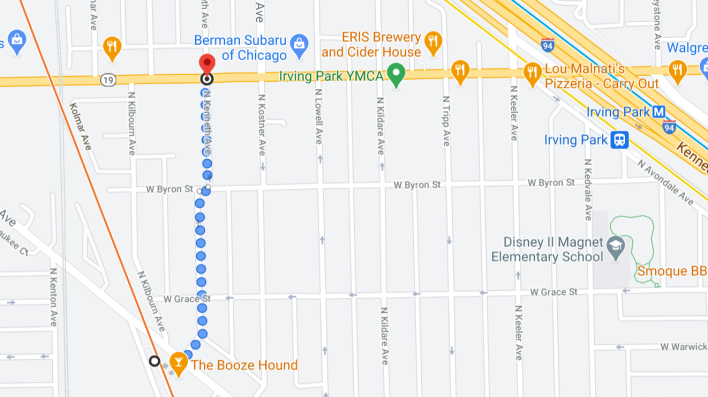
Unfortunately, even if Northwestern wanted to do the right thing by encouraging people to take transit to the clinic instead of driving when possible, mostly likely the many neighbors wouldn't be happy about a reduction in garage spots, assuming that would lead to an on-street parking crunch.
This situation reminded me of efforts by South Side residents to stop Amazon from opening a new warehouse in Bridgeport that would bring lots of new truck traffic to the area. Ultimately the fulfillment center was approved by the city despite the added congestion, pollution, and traffic dangers it will create. While the Old Irving Park residents are at least getting a new stoplight and likely some traffic calming, which shows that on some level the city listened to their concerns, the South Siders who oppose the Amazon project are basically being ignored.
It's unfortunate residents have to take it upon themselves to bring up the issues associated with car-centric developments. It's also disappointing the city is failing when it comes to making transit competitive and attractive compared to driving, as well as protecting people on foot and bike from traffic violence. These things would go along way towards decreasing the need for cars and making our streets safer for all users.
Stay in touch
Sign up for our free newsletter
More from Streetsblog Chicago
Today’s Headlines for Thursday, April 26
The de-facto ban on riverwalk biking is back. What should we do about it?
In the short term, new signage is needed to designate legal areas for cycling on the path. In the long term CDOT should build the proposed Wacker Drive protected bike lane.

